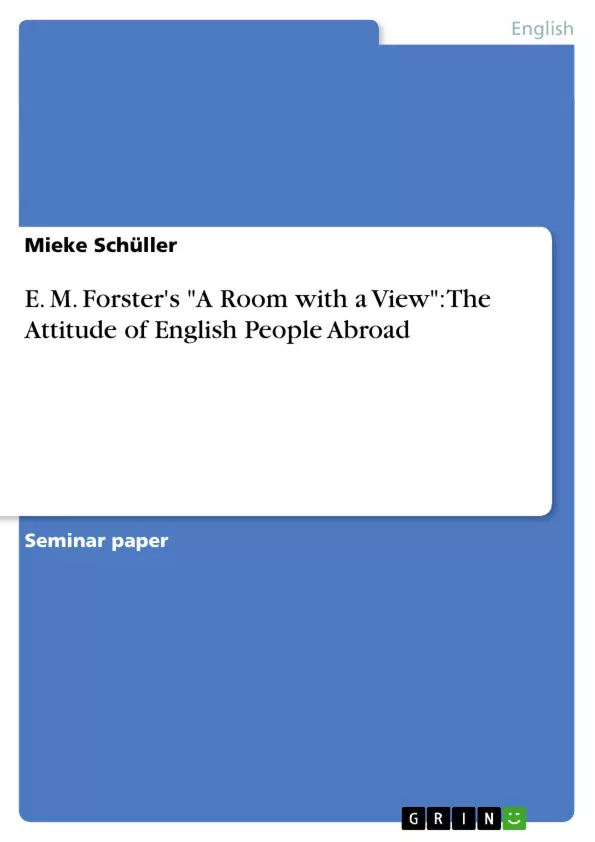The novel A Room with a View by Edward Morgan Forster was published in 1908. It is considered as one of Forster’s major novels, and “[i]t is probably his most well-liked novel, perhaps because (with the dubious exception ofMaurice)it is the only one to have a happy ending” (Cavaliero 93). His novelsWhere Angels Fear to TreadandA Room with a Vieware often referred to as Forster’s ‘Italian novels’. Immediately after his return from Italy and Greece Edward Morgan Forster took up the work with a novel that can be considered as the prototype ofA Room with a View.This work is known as the ‘Lucy novel’ or the ‘Lucy fragments’. But he stopped working on it for some time, and a few years passed before he dealt again with it. Only “[i]nA Room with a ViewForster takes up the fragments contrasting Italy and England which are found in the early ‘Lucy novels’ and brings them to a successful conclusion” (Cavaliero 93).
The critic on the constrictive and rigid rules of social life in English society has often been an issue discussed by Edward Morgan Forster, and it is a central issue inA Room with a View.Furthermore Forster calls attention to the behaviour of the English people abroad. He introduces very different characters in order to show different points of view and behaviours. It is interesting that most of the English tourists described inA Room with a Vieware more or less presented as unpleasant people. This is due to the fact that they do not fit into the Italian environment because of their affected behaviour. By describing the behaviour of the English tourists and residents at Florence Edward Morgan Forster reveals a lot about English mentality, and he sometimes overtly criticizes it. As Forster himself travelled Italy and Greece, it can be assumed that he made experiences and acquaintances that served as a model for some of the situations and characters described inA Room with a View.Forster clearly distanced himself from this kind of people, or more precisely, tourists. Edward Morgan Forster offers an interesting point of view to the reader, because he was English himself, but nevertheless critically observed the attitude of his fellow countrymen. Furthermore, the behaviour of the English tourists in Italy might be considered as representative for the attitude of the English people towards the Continent, and therefore the topic of this research paper fits into the context of “The British and the Continent”.
Inhaltsverzeichnis (Table of Contents)
- Introduction
- The Attitude of English Tourists Abroad
- The Attitude of English Residents in Italy
- The Impact of Italy on the Development of Lucy Honeychurch
- Lucy's First Impression of Italy
- Lucy's Visit to Santa Croce
- The Murder
- The Drive to the Countryside
- Conclusion
Zielsetzung und Themenschwerpunkte (Objectives and Key Themes)
This research paper examines the attitudes and behavior of English tourists and residents in Italy, as depicted in E. M. Forster's 1908 novel, A Room with a View. The paper focuses on the contrasting values and social norms of English and Italian culture, particularly as they relate to the character of Lucy Honeychurch. The analysis explores how Lucy's experiences in Italy challenge her traditional English upbringing and contribute to her personal development.
- The clash between English and Italian cultural values.
- The role of travel in personal growth and self-discovery.
- The impact of social conventions on individual behavior.
- The portrayal of English tourists and their attitudes towards foreign cultures.
- The development of Lucy Honeychurch's character in relation to the Italian setting.
Zusammenfassung der Kapitel (Chapter Summaries)
The introduction sets the context for the research paper, outlining the significance of A Room with a View as one of Forster's major novels and its connection to his earlier "Lucy fragments." It highlights the importance of social conventions in English society and the contrasting behavior of English tourists in Italy.
Chapter 2 delves into the behavior of English tourists abroad, exploring the ease of travel to the Continent in the late 19th century and the expectations placed upon upper-class individuals to broaden their horizons through foreign travel. This chapter also discusses the limitations of relying solely on guidebooks for understanding a country and the importance of developing a deeper appreciation for its nuances and culture.
Chapter 3 examines the attitudes of English residents in Italy, highlighting the stark differences in social norms and the impact of these differences on the interactions between English tourists and the local population. The chapter provides examples from the text to illustrate how the rigid social conventions of English society often clash with the more relaxed and expressive Italian culture.
Chapter 4 explores the influence of Italy on the development of Lucy Honeychurch. This chapter delves into Lucy's initial impression of Italy, her experience visiting the Santa Croce, the encounter with a murder, and the drive through the Italian countryside. Each of these experiences serves to challenge Lucy's traditional English upbringing and contribute to her personal growth.
Schlüsselwörter (Keywords)
This research paper explores key themes such as cultural contrast, travel, social conventions, English identity, and personal development. It analyzes the behavior of English tourists, the impact of the Italian setting on the protagonist, and the significance of cultural differences in shaping individual experiences. The focus of the paper is on E. M. Forster's A Room with a View, highlighting the role of travel and cultural immersion in fostering personal growth and self-discovery.
- Arbeit zitieren
- Mieke Schüller (Autor:in), 2001, E. M. Forster's "A Room with a View": The Attitude of English People Abroad, München, GRIN Verlag, https://www.grin.com/document/44789



